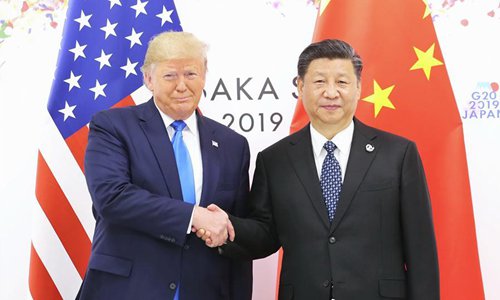HOME >> CHINA,SPECIAL-COVERAGE
China, US agree to restart trade talks; hurdles seen for negotiators
Source:Global Times Published: 2019/6/29 15:53:07

Chinese President Xi Jinping meets with U.S. President Donald Trump in Osaka, Japan, June 29, 2019. (Photo: Xinhua)
Chinese President Xi Jinping and US President Donald Trump have agreed to restart trade consultations on equal terms, the Xinhua News Agency reported on Saturday. The outcome of the meeting has been welcomed but analysts have warned of a difficult process ahead for negotiators.
The latest development in the year-long trade war between the world's two largest economies followed the widely anticipated meeting between Xi and Trump on the sidelines of the Osaka G20 summit. The meeting, lasting for around 80 minutes, ended at 1 pm local Japanese time.
Xi said that China is sincere in continuing trade negotiations and managing differences with the United States.
However, negotiations should be based on equality and mutual respect and address each other's legitimate concerns, he stressed
Trump said that the US will not impose new tariffs on Chinese exports. He noted that the US side hopes to solve the trade imbalance through negotiations and provide fair treatment to firms in China and the US. Trump added he hopes China could increase imports from the US, according to Xinhua.
The US is willing to reach a trade agreement with China that both sides could accept, and such consensus would be of great historical significance, the US president said.
Xi called on the US to accord fair treatment to Chinese enterprises and students to allow normal business cooperation and people-to-people exchanges between the two countries.
Trump said he harbors no hostility toward China and hopes for better relations between the nations.
Trade teams from the two countries will further discuss detailed issues.
The two leaders' meeting on Saturday left existing US tariffs on $200 billion worth of Chinese goods unchanged.
Outcome of the talks between the two presidents has taken Japan by storm. Even the ordinary Japanese is interested in the results of the interaction between the leaders of the two largest economies. Enthusiastic journalists haven't spared any effort in asking Osaka residents what they feel about what the meeting has come out with.
"It's a breakthrough. At least no bombs… The environment is peaceful," an Osaka resident going by the surname Uchiyama told the Global Times on Saturday.
China and the US share common ground in creating an expectation on dividends from sustaining their cooperation, said Bai Ming, deputy director of the Ministry of Commerce's International Market Research Institute.
"The US is facing economic pressure, in part from the trade tariffs war, and Trump needs a sound US economic performance for the upcoming presidential election," Bai told the Global Times on Saturday.
The model on which trade consultations work will be re-clocked to December 2018 while the basis on which consultation can be continued is re-clocked to May, Bai said. Negotiations broke down in May and the US government increased additional tariffs on $200 billion worth of Chinese imports.
It has been reported that the trade talks in May had come within kissing distance of an agreement, being 90 percent complete, when negotiations broke down. However, it is believed that negotiators will find it hard to navigate through the remaining 10 percent to come to a deal.
"Since the US has a record of walking away from deals, so we can only have cautious optimism," Bai said.
Although the meeting of the two leaders set off another round of trade talks, major hurdles need to be overcome by negotiators, requiring fundamental changes in the US approach to China, Chinese analysts said.
"If the US wants to reach an agreement, it must first find a more balanced approach to China," said Liang Haiming, dean of the Belt and Road Institute at Hainan University who is closely following the trade talks. "They should not discuss about China's state-owned economic model and should not ask China to change its laws."
The US cannot use China's internal affairs like those related to Taiwan and Hong Kong as bargaining chip, because China will never sign a deal under coercion, Liang told the Global Times on Saturday.
Posted in: DIPLOMACY,FOCUS